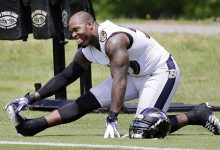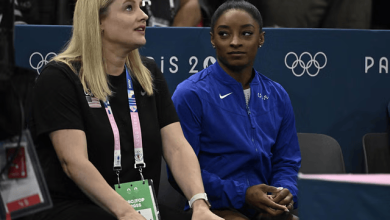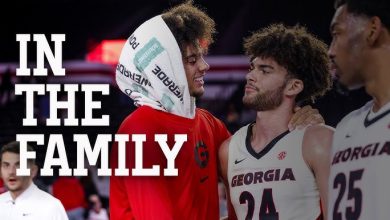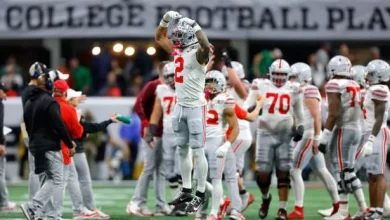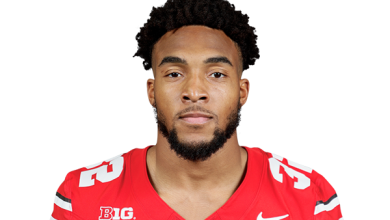Notre Dame’s Greatest Heisman Snub: The Legendary College Player Who Deserved the Trophy But Was Sadly Overlooked
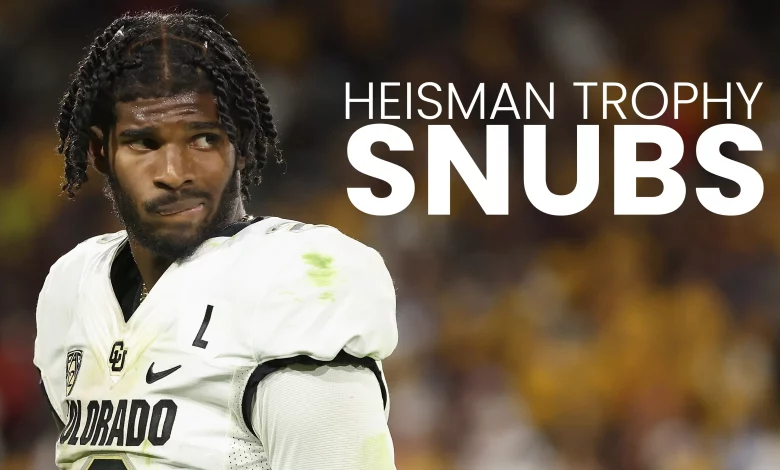
College football is full of rich traditions, legendary rivalries, and stories of triumph and heartbreak. One of the most cherished individual honors in the sport is the Heisman Trophy—awarded annually to the most outstanding player in college football. Notre Dame, a powerhouse in college football history, boasts an impressive legacy with seven Heisman winners, tied for the most by any school. However, in the long and storied history of the Fighting Irish, there are some players whose brilliance on the field went unrewarded. Among these, one name stands out as perhaps the greatest Notre Dame player who should have won the Heisman but didn’t: Brady Quinn.
Brady Quinn’s career at Notre Dame from 2003 to 2006 was marked by excellence, leadership, and a statistical legacy that redefined the program’s record books. As the starting quarterback under head coach Charlie Weis, Quinn led Notre Dame back to national relevance and put up staggering numbers during his junior and senior seasons. He embodied everything a Heisman winner should be: talented, productive, consistent, and a true leader on and off the field. And yet, despite his incredible college career, he never brought home the sport’s most coveted individual honor.
Quinn’s 2005 and 2006 seasons, in particular, should have earned him the Heisman. In 2005, Quinn threw for 3,919 yards with 32 touchdowns and just 7 interceptions. He led Notre Dame to a 9–3 record and a berth in the Fiesta Bowl, revitalizing a program that had become stagnant in the early 2000s. He operated a high-powered offense with precision, showcasing elite arm strength, football IQ, and poise under pressure. In nearly every measurable way, he was the most valuable player in college football that season.
However, the 2005 Heisman went to Reggie Bush, the electrifying USC running back whose highlight-reel runs and dynamic versatility captured the nation’s imagination. Bush was undeniably spectacular, but the award was later vacated due to NCAA violations. If the voters had considered not just the eye-popping highlights but also the comprehensive value, consistency, and leadership a player brought to his team, Brady Quinn might have received far more votes—and perhaps walked away with the trophy.
In 2006, Quinn came back even better. He passed for 3,426 yards with 37 touchdowns and just 7 interceptions, leading the Irish to a 10–2 regular season and another BCS bowl appearance. He was named the Maxwell Award winner, given to the best all-around player in college football, and also received the Johnny Unitas Golden Arm Award. Both of these accolades are often considered precursors or complements to the Heisman, reinforcing the belief among many fans and analysts that Quinn was deserving of college football’s top honor.
Yet, the 2006 Heisman went to Ohio State’s Troy Smith, who had a solid season and led his team to an undefeated regular season and a national title game appearance. Smith’s leadership and performances in big games were impressive, but he didn’t carry the statistical weight or transformational impact that Quinn did. Notre Dame’s offense revolved completely around Quinn, and without him, they wouldn’t have reached double-digit wins or national prominence. It’s hard to imagine Ohio State falling far without Smith, but Notre Dame without Quinn would have been unrecognizable.
Part of the reason Quinn may have been overlooked lies in the perception of Notre Dame at the time. The Irish had gone through a series of disappointing years before his rise, and while Quinn helped return them to the national spotlight, skeptics still questioned whether the team truly belonged among the elite. Additionally, Notre Dame’s struggles in big games—like blowout losses in BCS bowls—may have unfairly colored voters’ views, despite those games taking place after Heisman voting concluded.
There’s also a narrative element to Heisman voting that often skews the results. Flashy plays, undefeated seasons, and media hype play a disproportionate role. While Quinn was as consistent and productive as any quarterback in the country, he lacked the national “wow” factor in some eyes. But that perspective ignores the substance of what makes a player great. Leadership, accuracy, durability, and making the players around you better—Quinn checked all those boxes and more.
Beyond the numbers and awards, Quinn’s impact on Notre Dame football was profound. He helped usher in a new era for the program, leading it from mediocrity back to national contention. He holds multiple school records, including most career passing yards (11,762), touchdown passes (95), completions (929), and total offense (11,944 yards). These aren’t just solid numbers; they’re historic. They place him among the greatest quarterbacks not just in Notre Dame history, but in the annals of college football.
In hindsight, many fans and analysts believe Quinn was more deserving of the Heisman than the players who won it during his final two years. The 2005 and 2006 seasons were the apex of his career, and his omission from the top of the Heisman ballot remains one of the most glaring oversights in the award’s history. While players like Reggie Bush and Troy Smith were worthy contenders, the full context suggests Quinn should have at least won once, if not both years.
Notre Dame fans remember Brady Quinn not only for his talent but for the hope and excitement he brought back to South Bend. He gave the fanbase something to cheer for again—a chance to believe in championships and big-time bowl games. He inspired younger players and brought credibility to a new coaching regime. All those intangibles should have counted for more in the Heisman conversation. He was the face of a resurgent program and the leader of an explosive offense in one of college football’s most scrutinized environments.
Even today, almost two decades later, his name sparks debates about Heisman fairness and the criteria used by voters. Did they overlook substance for style? Did regional biases or media narratives influence the final tally? Possibly. But what remains undeniable is this: Brady Quinn played like a Heisman winner. He led like one. He produced like one. He just didn’t get the trophy.
It’s worth remembering that the Heisman isn’t always about who’s best in a vacuum. It’s about perception, media momentum, timing, and sometimes politics. But that doesn’t mean we can’t look back and acknowledge mistakes. Just as many believe Peyton Manning should have won the Heisman in 1997, or that Andrew Luck was snubbed in favor of flashier players, so too should we revisit Brady Quinn’s legacy with the respect it deserves.
He may not have a bronze statue in New York, but in the hearts of Notre Dame fans and informed college football followers, Brady Quinn remains one of the greatest players never to win the Heisman Trophy. His story is a testament to how excellence doesn’t always get its due in real time—but it endures.


